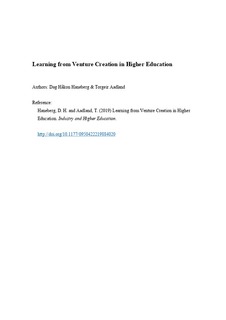Learning from venture creation in higher education
Journal article, Peer reviewed
Accepted version

Åpne
Permanent lenke
http://hdl.handle.net/11250/2639218Utgivelsesdato
2019Metadata
Vis full innførselSamlinger
Sammendrag
This article explores how students learn from venture creation in higher education by using a novel empirical approach: the Zaltman metaphor elicitation technique (ZMET). This inductive research approach provides extraordinarily rich data that enable a thorough and holistic understanding of students’ learning processes. The participant selection differentiates students who pursue venturing throughout their entrepreneurship education programme and those who exit venturing halfway through, and the article is the first to pinpoint differences between how students with and without ventures in the same environment learn. The findings reveal that students who choose to exit their new ventures learn based on a community of practice – which is facilitated by other students’ venture creation – while the learning process of students who pursue venturing is in line with previous research. Thus, the present article contributes by empirically demonstrating what previous conceptual contributions have suggested: that researchers should emphasise situated and social learning as an integral element of students’ learning in action-based entrepreneurship education. For practice, the findings imply that entrepreneurship education programmes, in which students learn through venture creation, should be organised in a way that leads them to establish relationships and interact with each other on a regular basis.